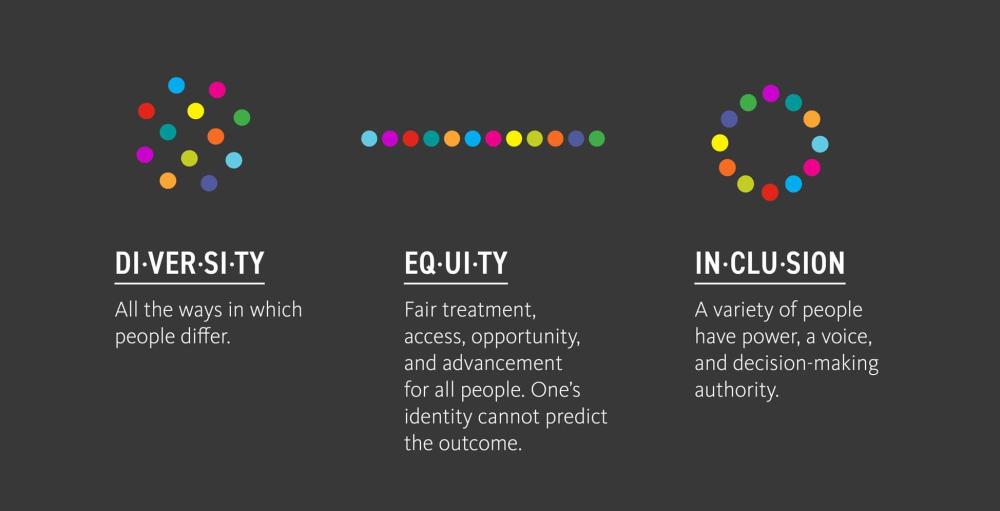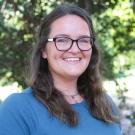
Learning, Unlearning and Sharing the Power
An Interview with The Aquarium of the Pacific's Emily Yam and Erin Lundy

The OWCN is committed to ongoing excellence, education, and progress. As a part of our commitment to Diversity, Equity, Inclusion, and Access (DEIA), we will be interviewing figures from our community and Network who are leading DEIA efforts in their organizations and presenting those interviews here, in the OWCN blog, to serve as inspiration for others.
Here’s the next in the series: Learning, Unlearning & Sharing the Power
Recently I sat down with Emily Yam, the Director of Learning and Public Engagement, and Erin Lundy, Conservation Coordinator for the Mammal and Bird Department, at the Aquarium of the Pacific. We had a candid conversation about DEIA and how the Aquarium is moving forward with intention.
For starters I want to add that Emily and Erin do not speak for the entirety of the aquarium but are a good representation of learning, unlearning, and overall strive to better the staff and guest environment.
Emily and Erin have spent their careers building up a rapport with not only their department but outwardly with their communities. Emily has years of Conservation Education experience. She holds multiple degrees– a bachelor's in biology and 2 master's degrees, one in Teaching and another in Marine Science. Erin has years of behind-the-scenes animal husbandry work and is currently pursuing a master's degree of Environmental Management– both of which come together daily in her work with staff of all titles AND the public. Whether it be in person at the aquarium or online reaching people all over the world they are working to make a comfortable environment.
After a conversation with Emily and Erin about how much more there is to do, I walked away feeling proud of the DEIA work being done. For starters, admitting there is more to be done– that right there is no easy feat; and then noting all the exciting things already in place. Here, I hope to share a glimpse of their ongoing work.
I have known and admired Emily’s work for a while now; each and every time our paths have crossed, I have been both overwhelmed by her progress (it’s a compliment I swear) and in awe of her hard work. Emily shared a little bit of her history in improving communities that go as far back as 2012, and probably farther. Emily, along with the Education Department at the Aquarium, have led a Professional Development Series called “Reflecting on Practice” put on by the National Science Foundation. Throughout 2018 and 2019, they provided professional development modules for staff, including various DEIA readings, and hosted monthly meetings to discuss topics and allow employees in entry-level positions to take charge of these discussions. According to Emily,
the working group helps champion topics from their peers. This comes from sharing power; everyone needs to be invested in advancing work and making mistakes and learning & unlearning."
This working group is led by hourly staff for the department to engage in discussion and supported by supervisors. By doing this, they [supervisors] are ‘sharing the power’ of hosting a conversation while supplying resources and space. Supervisors check in to see what level of involvement everyone has, but otherwise they step aside, allowing the working group to have a voice.
Not everyone is constantly in a place to grow- unlearning what you know with the purpose of growth takes a toll, so when individuals are ready to take on a difficult or new topic, supervisors and committees welcome staff with open hands. The concept of unlearning stems from a place of vulnerability, and is the intentional breaking down of old habits, thought processes, and ways, with the purpose of growth accountability and sincerity. Here are a few additional resources to learn more about unlearning :
The Art of Unlearning by Ken Spring
https://emeritus.org/blog/learning-to-unlearn/
https://www.linkedin.com/pulse/importance-unlearning-discard-old-welcome-change-himanshu-shekhar-
For a long time, the zoo and aquarium industry standard has been for individuals to have experience before they could even think about being paid for animal care. Meaning, unpaid work such as internships and volunteering were the norm to even be considered for these coveted job opportunities– and the fact of the matter is, not everyone has the privilege, access, or financial backing to get that experience. So, the industry boxed itself in with people who could afford it.
Erin shares how,
the aquarium has lifted some of those barriers. Not requiring a degree or hands-on experience, and in some cases a SCUBA certification is not required, to have a job in husbandry."
This is a big achievement and a great start to being more inclusive and allowing for a more diverse team. Erin also stated that for a long time she was "the only person of color on [her] team, and that has shifted so much already, for the better."
The Aquarium of the Pacific is a non-profit that relies heavily on their volunteers (like most of our Member Organizations) to carry out the amazing work of the organization. In 2020, the Bird and Mammal Department made a conscious decision to hire people with less hands-on experience, thereby granting access for Long Beach and the surrounding Los Angeles community to get involved and opening the door to people who never imagined they could pursue a ‘dream job’ in animal care.
Another success was doing away with unpaid internships. Paid internships have now started popping up throughout the institution and are one part of the education department's STEM (science, technology, engineering, and mathematics) pathways initiatives designed to lower barriers to participation in STEM.
Emily shares how she and the Education Department are “lifting interviewing anxieties with some simple and effective changes. Each interviewee receives half of the questions ahead of time, and has a scenario assigned. That alone takes the edge off and people can come to an interview their best self.” Some communities have never been exposed to a professional interview setting and that is no reason to not hire someone. We all get the interview jitters; this is a wonderful way to give all candidates an equitable interview process and an opportunity to be even better prepared- it is so welcoming.
The Aquarium has also
posted wages for their department since 2020, despite it only being passed into law in California earlier this year.”
Discussing wages is hard, an often-gatekept conversation; this level of transparency has added a sense of comfort to the candidate. Fully understanding the position they are applying for is so important, it levels the field. If the pay doesn’t meet their needs, candidates can prepare for bargaining or apply elsewhere.
Talking about what needs to be addressed is difficult; sharing out challenging or new DEIA topics to the hundreds of employees and a thousand plus volunteers is even more difficult. Finding time to prioritize learning is probably the hardest to apply in this fast-paced society.
One helpful training program regarding DEIA issues that Emily and her team have emphasized is Kulture City. This organization is “the nation's leading nonprofit on sensory accessibility and acceptance for those with invisible disabilities, PTSD, autism, dementia, [and] strokes, to list a few...”
I have taken this training, and given the wide range of people who visit the aquarium annually, each staff person is bound to gain from this training. It teaches language and sets a standard for the staff and guests to know where they can seek assistance if needed. Some examples include sensory rooms, sanitized soundproof headphones, and providing tools to better engage individuals with sensory needs. You can learn more on their website here: www.kulturecity.org.
Another achievement of the Aquarium has been providing enhanced access to online education. Of course, the pandemic really served to emphasize the Aquarium’s online presence, but long before 2020 the Aquarium worked hard to engage with people– from online learning modules to quick 30-second videos for their 2.4 million viewers on TikTok, Twitter, Instagram, Tumblr, Facebook, etc. Additionally, the Aquarium recently published their Centésimo Episodio en Español (100th online learning academy in Spanish) which you can view here.
I asked Emily and Erin what they are looking forward to, and what is next for the Aquarium’s Diversity, Equity, Inclusion, Access, Belonging, and Justice (+) journey. Erin shares that they are currently
setting the groundwork for all departments to have training and continued education for individual, departmental, and institution-wide growth.”
Emily adds “continuing to realize that who you meet on day 0 and what they could do on day 1000 [are] two different things”, so invest in people– find their strengths and everyone will benefit.
Continuing to ‘Share the Power’ is a critical component of inclusion but can be challenging. Staff becoming involved in their own training and learning is one way to advance this.
For example, Erin shares, “If there is a bird exam, we invite aquarists who are technically OWCN responders, but their skill set, and areas of expertise are with fish and invertebrates. Some of these responders have never held a bird. Bird exams are few and far between so scheduling in that training is important".
Emily and Erin are only a small representation of the Aquarium’s success– from scholarship programs and cultural festivals that go back 22 years celebrating communities near and far (including the Tongva and other local First Peoples), to climate and community conversations that have been ongoing. I really could go on, and on.
The Aquarium has outwardly led the community in diversity, equity, inclusion, access, belonging and justice. So, I ask you, would you consider lifting background criteria for the job? Or allowing a portion of the questions to be sent out? All in the spirit of making the field more representative of the people around you? Have you considered what languages exist in your community? How do you apply that to your operations? What topics do you need to unlearn to relearn with a new lens? Are you prepared to share the power, and in turn build a stronger team? The questions are never ending, and what matters is growth and forward movement.
I take on each day figuring out how to better myself and my team around me. I can’t wait to have this conversation with another Member Organization soon. If you are interested in chatting about your institution’s DEIABJ+ successes, please reach out.
Thank you so much to Erin and Emily for their time and continued leadership and congrats to The Aquarium of the Pacific for their 25th anniversary this year!

Frankie Lill
Wildlife Planning Specialist
OWCN DEIA Outreach & Education Working Group
OWCN@ucdavis.edu
